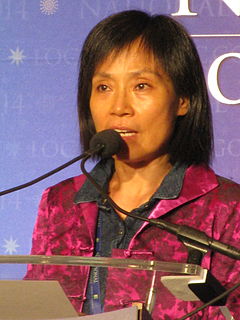A Quote by Anchee Min
Do you know who Karl Marx is? He is this strange little man, long dead, who lived his narrow little life, and somehow managed by the power of his wayward brain to lay hold upon millions of human lives!
Related Quotes
Letting go all else, cling to the following few truths. Remember that man lives only in the present, in this fleeting instant: all the rest of his life is either past and gone, or not yet revealed. This mortal life is a little thing, lived in a little corner of the earth; and little, too, is the longest fame to come - dependent as it is on a succession of fast-perishing little men who have no knowledge even of their own selves, much less of one long dead and gone.
It was pitch dark. I could hear only the violin, and it was as though Juliek's soul were the bow. He was playing his life. The whole of his life was gliding on the strings--his last hopes, his charred past, his extinguished future. He played as he would never play again...When I awoke, in the daylight, I could see Juliek, opposite me, slumped over, dead. Near him lay his violin, smashed, trampled, a strange overwhelming little corpse.
What a wee little part of a person's life are his acts and his words! His real life is led in his head, and is known to none but himself. All day long, the mill of his brain is grinding, and his thoughts, not those of other things, are his history. These are his life, and they are not written. Everyday would make a whole book of 80,000 words -- 365 books a year. Biographies are but the clothes and buttons of the man -- the biography of the man himself cannot be written.
Life cannot be cut off quickly. One cannot be dead until the things he changed are dead. His effect is the only evidence of his life. While there remains even a plaintive memory, a person cannot be cut off, dead. And he thought, “It’s a long slow process for a human to die. We kill a cow, and it is dead as soon as the meat is eaten, but a man’s life dies as a commotion in a still pool dies, in little waves, spreading and growing back toward stillness.
Where man had been, in every place he left, garbage remained. Even in his pursuit of the ultimate truth and quest for his God, he produced garbage. By his garbage, which lay stratum upon stratum, he could always - one had only to dig - be known. For more long-lived than man is his refuse. Garbage alone lives after him.
Prince was outside his dressing room, shaking one of those little Easter egg maracas. His hair was straightened to a soft wave; his eyelashes were unfairly lovely. He smelled like the most expensive shelf in the Sephora perfume aisle. This man wearing eyeliner, heels and ladies' perfume somehow managed to be more masculine than the burly bodyguard.
What was more needed by this old man who divided the leisure hours of his life, where he had so little leisure, between gardening in the daytime, and contemplation at night? Was not this narrow enclosure, with the sky for a background, enough to enable him to adore God in his most beautiful as well as in his most sublime works? Indeed, is not that all, and what more can be desired? A little garden to walk, and immensity to reflect upon. At his feet something to cultivate and gather; above his head something to study and meditate upon: a few flowers on the earth, and all the stars in the sky.
There were times when it appeared to Dorian Gray that the whole of history was merely the record of his own life, not as he had lived it in act and circumstand, but as his imagination had created it for him, as it had been in his brain and in his passions. He felt that he had known them all, those strange terrible figures that had passed across the stage of the world and made sin so marvellous, and evil so full of subtlety. It seemed to him that in some mysterious way their lives had been his own.
He no longer wished to be dead. At the same time, it cannot be said that he was glad to be alive. But at least he did not resent it. He was alive, and the stubbornness of this fact had little by little begun to fascinate him - as if he had managed to outlive himself, as if he were somehow living a posthumous life.






































